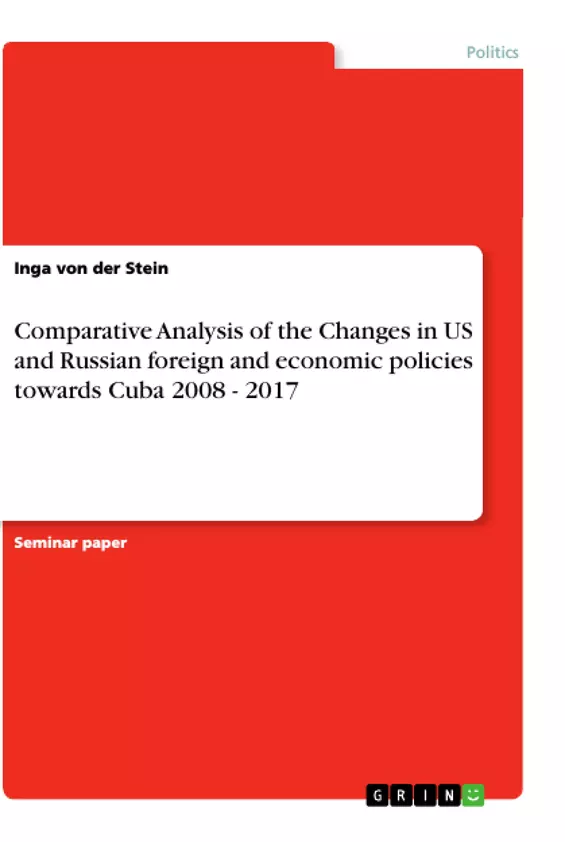This paper is a comparative case study which investigates the type and sources of the changes in foreign and economic policies by the US and Russia towards Cuba in the time frame of 2008 –2017 for two main reasons: firstly, both the US and Russia changed their policies towards Cuba remarkably in this episode; secondly, US-Russia relations went through several distinctive changes in this period, which arguably influenced their respective relations to Cuba (Stent, 2015, p. 10).
To analyse and compare the policy changes, an alternative explanatory model to analyse foreign policy change (FPC) is constructed. This model is constituted by a three-step procedure. As a first step, it employs the sources of FPC as independent variables as outlined by Eidenfalk, while it puts emphasis on the political-institutional setting as an additional independent variable. The second step is constituted by Eidenfalk’s “window of opportunity”, which needs to be perceived by policy-makers to enact change. The third step is formed by the four degrees of FPC which are employed as dependent variables as put forward by Hermann.
This study has both empirical and theoretical aims. The empirical aim is to identify the degree and the most influential factors of the policy changes undertaken by the US and Russia towards Cuba. However, this study also demonstrates broader implications on the similarities and differences of the sources of Russian and US foreign policy-making and moreover, on US-Russia relations in general. Since these two countries have a tremendous effect on world affairs due to their leverage on the world stage, their bilateral relations can considerably affect other players of the international system. Further, this paper adds to the discussion on the future development of Cuba, as the future of the island arguably depends on its relations with Russia and the US. The theoretical aim is to make a contribution to the study of FPC, by combining comparative foreign policy analysis (CFP) with the study of FPC.
Inhaltsverzeichnis (Table of Contents)
- Introduction
- Chapter 1 Literature Review
- Comparison of US and Russian foreign and economic policies towards Cuba
- Theories of Foreign Policy Change
- Chapter 2 Case selection
- Chapter 3 Theoretical Framework
- Chapter 4 Methodology
- Data collection
- Data analysis
- Chapter 5 Findings and Discussion
- Extent of Foreign Policy Changes
- US
- Russia
- Sources of Foreign Policy Changes
- US
- Russia
- Comparison
- Extent of Foreign Policy Changes
Zielsetzung und Themenschwerpunkte (Objectives and Key Themes)
This comparative case study investigates the nature and sources of changes in US and Russian foreign and economic policies towards Cuba between 2008 and 2017. The study aims to identify the degree and most influential factors of the policy changes undertaken by both countries. It also explores broader implications concerning the similarities and differences in Russian and US foreign policy-making, specifically focusing on US-Russia relations. The study aims to contribute to the understanding of foreign policy change (FPC) by combining comparative foreign policy analysis (CFP) with the study of FPC.
- Changes in US and Russian foreign and economic policies towards Cuba
- Sources of foreign policy change in both countries
- Comparative analysis of foreign policy-making in the US and Russia
- Implications for US-Russia relations
- Contribution to the study of foreign policy change
Zusammenfassung der Kapitel (Chapter Summaries)
The first chapter provides a literature review, discussing previous work on the research topic and various theories of FPC. It also explains the study's contribution to academia. The second chapter delves into the case selection, justifying the choice of Cuba as a case study. Chapter three outlines the theoretical framework employed to analyze the policy changes of the US and Russia towards Cuba. The fourth chapter focuses on the methodology, outlining data collection and analysis methods. Finally, the fifth chapter presents and discusses the findings of the study, exploring the extent and sources of foreign policy changes by both countries, and ultimately comparing the two.
Schlüsselwörter (Keywords)
This study focuses on comparative foreign policy analysis, foreign policy change, US and Russian foreign policy, US-Russia relations, Cuba, economic and political factors, foreign policy-making, and the impact of bilateral relations on international affairs.
Frequently Asked Questions
How did US foreign policy towards Cuba change between 2008 and 2017?
The study analyzes the significant shift during the Obama administration, which moved towards normalization of relations, and the subsequent changes under the early Trump administration.
What was the focus of Russian policy towards Cuba in this period?
Russia remarkably increased its engagement with Cuba between 2008 and 2017, focusing on economic cooperation, debt forgiveness, and revitalizing geopolitical ties as part of its broader foreign policy strategy.
How do US-Russia relations affect their respective policies towards Cuba?
The study argues that the bilateral relationship between the US and Russia influenced their approach to Cuba, often turning the island into a focal point for geopolitical competition or strategic signaling.
What is the "window of opportunity" in foreign policy change?
This theoretical concept refers to specific moments when political-institutional settings and external events align, allowing policy-makers to enact significant changes that were previously not feasible.
What are the four degrees of Foreign Policy Change (FPC)?
Based on Hermann's theory, the study examines whether changes were minor adjustments, program changes, goal changes, or a complete international orientation shift.
Why is Cuba an important case study for international relations?
Cuba serves as a unique intersection of Cold War history, post-colonial dynamics, and modern geopolitical maneuvering between major world powers like the US and Russia.
- Citar trabajo
- Inga von der Stein (Autor), 2018, Comparative Analysis of the Changes in US and Russian foreign and economic policies towards Cuba 2008 - 2017, Múnich, GRIN Verlag, https://www.grin.com/document/507537



